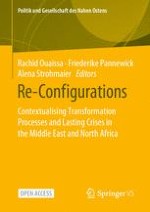Open Access 2021 | Open Access | Buch | 1. Auflage

Re-Configurations
Contextualising Transformation Processes and Lasting Crises in the Middle East and North Africa
herausgegeben von: Rachid Ouaissa, Friederike Pannewick, Alena Strohmaier
Verlag: Springer Fachmedien Wiesbaden
Buchreihe : Politik und Gesellschaft des Nahen Ostens